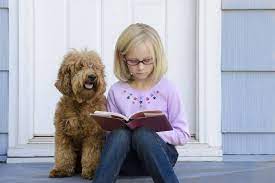
By: Martin Oldhues
Children nowadays are losing the basic ability to read and write, impacting their future to sustain jobs, as nearly 20 percent of Canadian Kids no longer frequently read, says Scholastics.
This inspired Caledon Public Library Youth Services Manager Laurie Groe and Brenda Dermott, Supervisor of Caledon Animal Services, to start the Readers Rescue Program, dedicated to giving kids critical reading with some furry friends.
“I approached Brenda about it, and we started it about two years before everything shut down,” said Groe
Many United States Libraries implemented similar programs, partnering with local Animal Shelters. Dermott, a Seneca College Graduate, believes kids and animals having connections is key.
“I appreciate the human-animal bonds, like how important pets are to families.”
The program, which runs from fall to spring, focuses on kids ranging from ages 6-9 who struggle to understand words, allowing them to have fifteen-minute sessions over eight to ten weeks and engages kids with animals, including cats and dogs. Groe mentions, “They (kids) get a real kick out of reading to the cats or the cats because they really think that they are listening and all of that, then that they are reading them a story.”
Stressing Reading and Writing
Literacy brings the power of knowledge and creativity to kids, according to the Cambridge Dictionary, especially at a young age when the human brain develops and experiences determine people’s future success.
The core value of the Caledon Library “is to develop a love of reading at a very young age. Our programs are open from birth. A lot of our programs that are geared for children in early literacy are from birth upwards,” Said Groe.
Groe mentioned Literacy is tied with life-long learning, and places, like Libraries provide free-barrier access.
Connecting with Animals
Most animals found by The Caledon Animal Shelter are strays, having no home and families to connect with.
The post-pandemic era has brought a rise in sheltered pets after homeowners obtained them during COVID-19, according to multiple Canadian Animal Shelters.
“Our objective in the town of Caledon is we take in homeless animals and either reunite them with their families or if there is no family, we put them up for adoption, Said Dermott, who became a Registered Veterinary Technician for her love of animals as a kid.
A University of Arizona Study found Animals interacting with Children helps their adaptability in a stress-free environment, leading them to be ready for adoption.
Gore said, “I would love to see that as a result of bringing folks to the shelter, that a cat or a kitchen or a dog or a puppy would wind up being adopted.”
Changes Coming to Program
The town is working towards new ideas, which haven’t been approved yet, according to Dermott. “We’ve gotten a lot of positive feedback from this, like talking to the parents.”
Demottt alluded to the struggles of the Animal Shelter’s location,”To be honest, our location is in the industrial area of Bolton. So, not a lot of residents may drive by here.”
Groe said, “We try to bring awareness to the animal shelter through a program we have running during exam time for the local high school students that when there in the library studying. I will reach out to Brenda, and especially in June, when there are more kittens. Brenda or her staff will truck over and bring over a few kittens to provide a respite in a quiet area.”
The two hope spreading awareness of it will see a rise in pets being adopted in the local community.

Be the first to comment